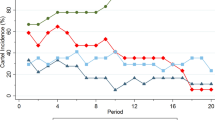Abstract
In the wake of the Enron and Worldcom financial scandals that rocked Wall Street in 2002, the US government’s financial regulatory body, the Security and Exchange Commission (SEC) took the unprecedented step in June 2002 of requiring that the chief executives and chief financial officers of America’s 947 biggest companies to swear on oath that their company results and financial reports were to the best of their knowledge accurate. The one-off order was quickly followed by the passing of the Sarbanes-Oxely act, which will require many more CEOs and CFOs to certify their company reports and financial statements at regular intervals. In this paper we apply a simple signalling model to examine whether or not this type of institutional signal of trustworthiness is always efficient. We find that in the presence of signalling costs, the separating equilibrium can be socially inefficient as well as causing a general loss of trust.
Similar content being viewed by others
References
Arrow, K. J. (1974). The Limits of Organization, Norton, New York.
Basu, K. (2000). Prelude to Political Economy, Oxford University Press, Oxford.
Bolle, F. (1989). “Levels of Aspiration Behavior, Promises, and the Possibility of Revaluation.” In: Grunert, K. W. and Ölsander, F. (eds.), Understanding Economic Behavior. Kluwer, Dordrecht.
Bolle, F. (2001). “Why Buy Your Darling Flowers: On Cooperation and Exploitation.” Theory and Decision. 50, 1–28.
Bolle, F. (2002). “Signals for Reliability: A Possibly Harmful Institution?” Central European Journal of Operations Research. 10, 217–227.
Butler, H. N. & Ribstein, L. E. (2006). The Sarbanes-Oxley Debacle, American Enterprise Institute Press, Washington.
Camerer, C. (1988). “Gifts as Economic Signals and Social Symbols.” American Journal of Sociology. 94, S180–S214.
Carmichael, H. L. & MacLeod, W. B. (1997). “Gift Giving and the Evolution of Cooperation.” International Economic Review. 38, 485–509.
Chatterjee, K. & Samuelson, L. (1990). “Perfect Equilibria in Simultaneous-Offers Bargaining.” International Journal of Game Theory. 19, 237–287.
Cho, I.-K. & Kreps, D. M. (1987). “Signalling Games and Stable Equilibria.” Quarterly Journal of Economics. 102, 179–221.
Coleman, J. S. (1984). “Introducing Social Structure into Economic Analysis.” American Economic Review (Papers and Proceedings). 74, 84–88.
Coleman, J. S. (1991). “Constructed Organization: First Principles.” Journal of Law, Economics, and Organization. 7, 7–23.
Dasgupta, P. (1988). “Trust as a Commodity.” In: Gambetta, D. (ed.), Trust: Making and Breaking Cooperative Relations. Blackwell, Oxford.
Emons, W. (2005). “Perjury versus Truth-Revelation: Quantity or Quality of Testimony.” Journal of Institutional and Theoretical Economics. 161, 392–410.
Gambetta, D. (ed.) (1988) Trust: Making and Breaking Cooperative Relations, Blackwell, Oxford.
Kreps, D. M. & Wilson, R. (1982). “Sequential Equilibria.” Econometrica. 863–894.
Raz, J. (1975). Practical Reason and Norms, Princeton University Press, Princeton.
Riley, J. (2001). “Silver Signals: Twenty-Five Years of Screening and Signalling.” Journal of Economic Literature. 39, 423–478.
Selten, R. (1975). “Re-Examination of the Perfectness Concept for Equilibrium Points in Extensive Games.” International Journal of Game Theory. 4, 25–55.
Smith, A. (1776/1981). An Inquiry into the Nature and Causes of the Wealth of Nations, Liberty Fund, Indianapolis.
Spence, M. (1973). “Job Market Signaling.” Quarterly Journal of Economics. 87, 355–374.
Spence, M. (1974). Market Signaling: Informational Transfer in Hiring and Related Screening Processes, Harvard University Press, Cambridge, MA.
Williamson, O. E. (1993). “Calculativeness, Trust, and Economic Organization.” Journal of Law and Economics. 36, 453–486.
Author information
Authors and Affiliations
Corresponding author
Additional information
JEL classificationC72. D81. D82. K22
Rights and permissions
About this article
Cite this article
Braham, M., Bolle, F. A difficulty with oaths: On trust, trustworthiness, and signalling. Eur J Law Econ 22, 219–232 (2006). https://doi.org/10.1007/s10657-006-0448-3
Issue Date:
DOI: https://doi.org/10.1007/s10657-006-0448-3




